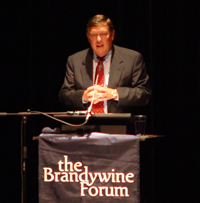How do you create hope today for children who are the future, but
as they look at the future, should not look at it in despair and the
only way that future hope is legitimate is that people are doing tangible
acts of kindness today: feeding the poor, taking care of children,
watching out for the most vulnerable in society, the justice issues…
And it is much as we do
it not simply to the least of these, but to one of the least of these.
So they come to the Kingdom one at a time, they come hungry one at
a time, they are born one at a time, and I can tell you, they die
one at a time. They are vulnerable people, with faces, and names,
and pulses and personalities, and God says: " This is what my
kingdom looks like ".
So,
watch out, and watch for them… And yes, I miss that part…

